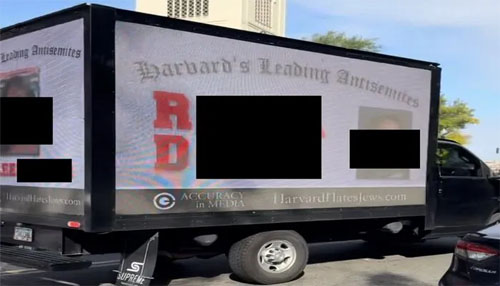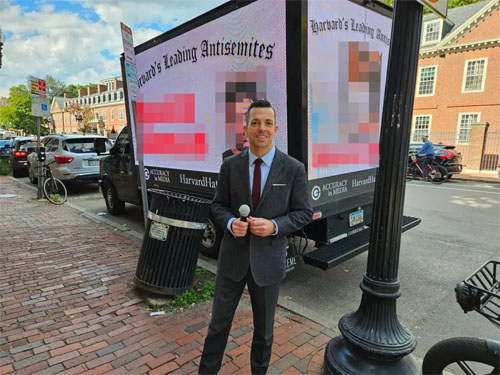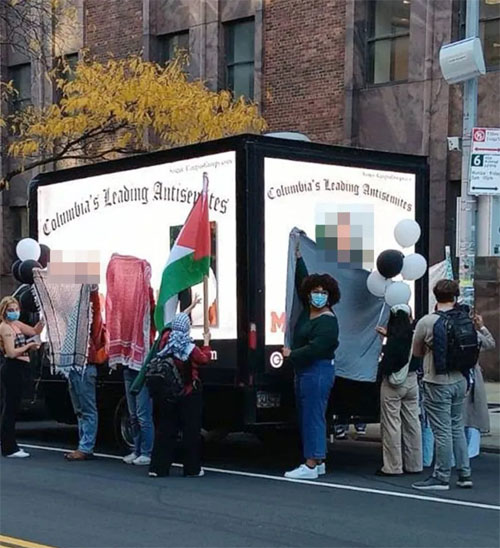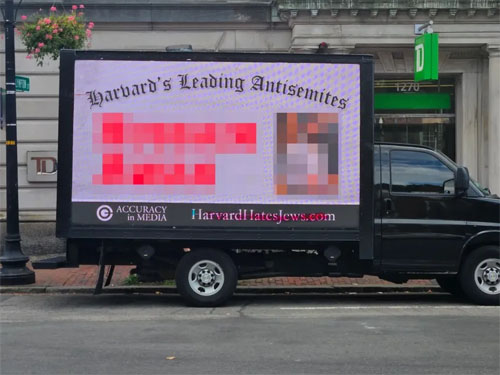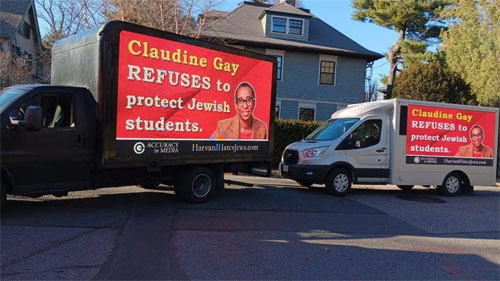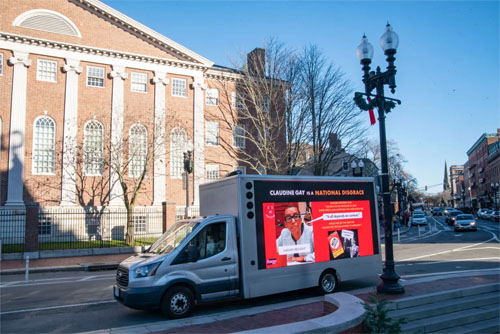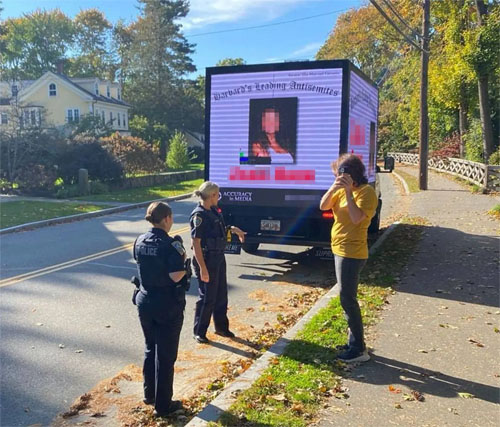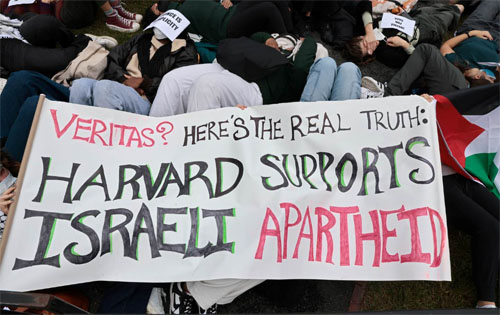by James Bamford
The Nation
November 17, 2023
"When Israel declared war, the first thing that the government should have done was declare a state of national emergency and told all the hostages: 'You will keep your mouth shut or we will shut them for you,'" Pollard said.
He said the Israeli government should have prevented the hostages' families from "interfering" with their management of this war.
He implied that the hostages' families were being "used by the international community" or "by our own leftists" as a weapon against the Israeli government.
"If that means imprisoning to silence certain members of the hostage families, then so be it — we're in a state of war."
-- The hostages' families should have been jailed to shut them up, says former US citizen who was an Israeli spy, by Rebecca Rommen, Business Insider, 11/24/23

Students gather in support of Palestine at Harvard University. (Joseph Prezioso / AFP via Getty)
As 2,000-pound bombs crash down on crowded refugee camps in Gaza, the seismic reverberations are increasingly being felt on campuses throughout the United States. “When a 2,000-pound bomb hits the ground, the earth turns to liquid,” Marc Garlasco, a military expert, told The Washington Post. “It’s like an earthquake.”
On October 11, a boxy white truck pulled up in front of the main entrance to Harvard University, a black wrought iron gate adorned with a stylish Georgian Revival wreath. Attached to the truck’s sides and back were three garish billboard-style LED screens displaying the images of dozens of students. Beneath their faces were the words “Harvard’s Leading Antisemites” and the putative URL “HarvardHatesJews.com.”
The doxxing truck was sponsored by the right-wing group Accuracy in Media and its targets were students who had signed a letter sponsored by the Harvard Palestine Solidarity Committee. “Today’s events did not occur in a vacuum,” it said. “For the last two decades, millions of Palestinians in Gaza have been forced to live in an open-air prison. Israeli officials promise to ‘open the gates of hell,’ and the massacres in Gaza have already commenced.” Leaving Harvard, the truck began a McCarthyite search and destroy mission, driving to the homes of each of the students to out their locations and ruin their future job prospects. Some of those targeted would later receive death threats while others worried about what might come next, with at least one losing a job offer. “I have my career on the line,” said one concerned student. Many other forms of harassment targeting pro-Palestinian students have been taking place across the country. The question is whether Israeli intelligence is behind some of it.
Harvard doxxing truck
Adam Guillette (pictured with the “doxxing truck” at Harvard’s campus) was not at his North Florida home when the cops showed up. He was in Texas with his wife to attend a wedding. Adam Guillette/ Accuracy in Media
The group behind the “doxxing truck” that ousted the names and photos of Harvard students who allegedly signed a letter blaming Israel for Hamas’ attacks deployed the same digital billboard-bearing vehicle at Columbia on Wednesday. Crowd held balloons, sheets, a Palestinian flag and open umbrellas to shield the truck’s display. Adam Guillette/Accuracy in Media
When Accuracy in Media’s “doxxing truck” took to campus on Thursday, someone lashed out by crossing out HarvardHatesJews.com in spray paint. The site leads to a forum to send an email to Harvard’s board of trustees.
A fleet of billboard-bearing box trucks parked outside of President Claudine Gay’s home on Tuesday and Wednesday, bashing the Ivy League head as “the best friend Hamas ever had.” Adam Guillette / Accuracy in Media
The trucks, deployed by news watchdog Accuracy in Media, encouraged onlookers to visit HarvardHatesJews.com and demand action from Harvard’s board of trustees. Adam Guillette / Accuracy in Media
In the wake of the congressional testimony, a truck circled Harvard Square replaying scenes of Gay from the controversial hearing. David McGlynn.
Accuracy in Media expanded its “doxxing truck” campaign this week and began parking it outside the home of a student leader allegedly involved in a group that co-signed a letter blaming Israel for Hamas’ attacks. Adam Guillette.
Accuracy in Media has also deployed a truck at the University of Pennsylvania, bashing the school’s president Elizabeth Magill for not condemning antisemitism on campus in the wake of a pro-Palestinian literature fest. Adam Guillette/Accuracy in Media.
Since March, I have detailed in The Nation Israel’s numerous illegal espionage and covert action operations targeting Americans in the United States—all without the slightest interference by the FBI. Among them:
• Prime Minister Benjamin Netanyahu’s deployment in 2016 of a clandestine agent to the US to provide secret intelligence to the Trump campaign in return for a promise to recognize Jerusalem as the undivided capital of the State of Israel—thereby trashing any hope for a negotiated settlement with the Palestinians.
• Hollywood producer Arnon Milchan’s long career as Israel’s key nuclear spy in the US, secretly supplying Israel with highly restricted nuclear materials, including nearly 1,000 krytrons, the triggers for nuclear bombs—bombs Israel claims it doesn’t have.
• Israel’s espionage and covert action operations within the US targeting American activists advocating for Palestinian human rights included deploying agents from Psy-Group, a secretive psychological warfare outfit, to spy on and harass Americans while hiding Israel’s role.
Next, Netanyahu secretly turned his attention to American students, faculty, and campus groups in the US fighting for Palestinian rights. Fearing the growing support for the Palestinian cause on college campuses, he established a covert front to spy on, harass, intimidate, and disrupt these groups. Critical to this effort is the little-known Washington-based Israel on Campus Coalition (ICC). For years the organization, with links to both Israeli intelligence and AIPAC, has used student informants belonging to Jewish and pro-Israel campus organization in the US to gather intelligence on pro-Palestinian students and groups.
“The ICC pools resources from all of the campus organizations. So that they’re tapped in on all angles,” Lila Greenberg, the senior national field organizer for AIPAC at the time, told Tony Kleinfeld in 2016. At the time, Kleinfeld, who is Jewish, was posing as a pro-Israel activist while working as an undercover reporter for an Al Jazeera documentary. He also met with Jacob Baime, currently the ICC’s chief executive officer and the former national field director for AIPAC. In his Washington headquarters, Baime boasted to Kleinfeld about the power of his organization to secretly attack American students who support Palestinian rights. “We built up this massive national political campaign to crush them,” he said.
To Kleinfeld’s hidden camera, Baime described ICC as basically a clandestine Israeli military command. “It’s modeled on General Stanley McCrystal’s counterinsurgency strategy in Iraq. We’ve copied a lot from that strategy that has been working really well for us, actually. And one of the pieces is this Operations and Intelligence Brief.” That intelligence brief, containing secret details about targeted American students and faculty, is then passed on to Israel’s Ministry of Strategic Affairs, according to Ian Hersh, then ICC’s director of operations and now its chief operating officer. Like Baime, Hersh is a former top AIPAC official. “In terms of information sharing, we did add the Ministry of Strategic Affairs to our Operations and Intelligence Brief,” he said. Baime told Kleinfeld that he also “coordinates with” and “communicates with” the ministry. Kleinfeld asked if he might be able to join in on the conversations occasionally, but Baime said no. “It’s a pretty sensitive conversation.”
They were striking revelations, indicating that Israel is illegally operating a secret nationwide campus spying operation within the United States, while Baime and his staff may potentially be acting as covert foreign agents for Israel. Once the data on pro-Palestinian students is passed on to Israeli intelligence, it can be used for covert operations to “crush” them, in Baime’s words.
In 2016, for example, Israel’s Psy-Group, a psychological warfare organization linked to Mossad, launched Project Butterfly. Secretly financed by wealthy Jewish donors in the United States, among its objectives was to use phony information to attack and destroy the reputations of its targets and brand them as terrorists. Ram Ben-Barak, then a top Psy-Group official and a former deputy director of Mossad, was enthusiastic about Butterfly and said the operation was like “a war.”
Among the many victims was Hatem Bazian, a lecturer at the University of California at Berkeley and a leader in the pro-Palestinian movement. One morning, as he was about to drive his daughter to school, he discovered a flyer on the windshield of his and other cars parked along the street of his quiet North Berkeley neighborhood. To his horror, the flyers contained his picture along with the caption in bold capital letters “HE SUPPORTS TERROR.” A dossier was also compiled on Bazian that included false and misleading data as well as phony charges of “antisemitism.”
“Bazian,” noted a secret Psy-Group report, “got our full attention in the last few weeks.” The document noted, “a HUMINT [on‑the-ground human intelligence] operation is conducted on each of the [targeted] individuals.”
According to Baime, the ICC’s war-room-like command center with its wall of flat-screen monitors uses the most advanced intelligence technology on the market. At the time it included Radian6, which monitored online conversation in real time from more than 650 million social media sources, including Facebook, Twitter, YouTube, blogs, and other online communities.
A dashboard provided geolocation data and other details. “We’re phasing that out over the next year and we’re bringing on more sophisticated technology that is developed in Israel,” Baime said. “The research operation is very high-tech. When I got here a few years ago the budget was $3,000. Today it’s like a million and a half, or more. Probably it’s 2 million even at this point. I don’t even know, it’s huge. It’s a massive budget.” It has since grown to $9 million.
The group even paid over $1 million to a high-powered Washington political consulting firm, FP1, to promote social media posts attacking students who supported Palestinian rights. Hidden behind its opaque digital wall, the ICC is free to name and shame, leveling spurious and outrageous charges of antisemitism and terrorism—just like the doxxing truck at Harvard (although there is no indication that that was an ICC operation). Intimidation is the goal—all without fear of being held to account, or disclosing their direct links to the Israeli government. Secrecy is therefore paramount. “We have a lot of communications capabilities, and what’s most interesting about it, I think,” said Baime to the hidden camera, “is that 90 percent of the people who pay attention to this space very closely have no idea what we’re actually doing, which I like. We do it securely and anonymously and that’s the key.”
Once collected, data from the ICC’s web of campus spies and high-tech Israeli surveillance equipment then flows to the Anti-Defamation League. Despite its name, the ADL largely acts as a pro-Israel propaganda organization, with director Jonathan Greenblatt spending much of his time doing media interviews about students and groups opposed to Israel’s illegal occupation and human rights violations. “These radical actors indisputably and unapologetically regularly denigrate and dehumanize Jews,” Greenblatt said in 2022—pointing the finger at two peaceful student groups, Jewish Voice for Peace and Students for Justice in Palestine.
The ADL then uses the information from the ICC’s campus spying operation, along with other data, to create an annual report: “Anti-Israel Activism on U.S. Campuses.” Despite the endless fearmongering, the results for 2021–22 were negligible: “One physical assault; 11 instances of vandalism; and 19 instances of harassment” among millions of students at 359 campuses across the country. Nevertheless, money is apparently no problem for the ICC. Seeing the massive numbers of young people taking part in pro-Palestinian rallies around the world, organizers of this week’s March for Israel rally in Washington were apparently concerned few students would show up for the event. The ICC therefore offered to pay any pro-Israel student $250 to attend. Which leads to the question, where does the ICC’s money come from?
Much of the financing comes from Adam Milstein, a shadowy convicted crook with very close ties both to Israel and to the late Sheldon Adelson. In 2015 Milstein was at Adelson’s side in Las Vegas when, at the request of Benjamin Netanyahu, the billionaire casino owner formed a secret task force to fight the pro-Palestinian Boycott, Divestment, and Sanctions (BDS) movement. “We know what happened during the Nazis in Germany,” Milstein said. “The boycott movement is not about borders, it’s not about policies, it’s about eradicating the Jews living in Israel.”
Listed as the sole board member, and the major donor to the ICC, in 2009 Milstein was convicted of federal tax evasion and sent to prison. Then, soon after his release, he made a very odd request to the Justice Department. He wanted to fly to Israel where, among other things, he would “meet with Israel’s Prime Minister,” Benjamin Netanyahu. The Justice Department granted the request.
Critical for Israel is hiding all government and financial links to US organizations covertly targeting Americans. To accomplish this, the Ministry of Strategic Affairs created a phony, innocent-appearing front organization, “Concert” (formerly Kela Shlomo). Supposedly a nonprofit Israeli “charity,” it was funded by approximately $35 million from the cabinet. A key reason for attempting to hide the ministry’s US operations behind the phony charity was concern that Americans could be arrested under the Foreign Agents Registration Act (FARA). Before the decision to create the front, the ministry attempted to pass millions of dollars to American Jewish organizations to pay for support and cooperation in carrying out its clandestine operations. One involved flying individuals to Israel to be trained as covert “influencers,” then back to the United States to spread pro-Israel propaganda.
Some organizations turned the ministry down, including the Jewish Federations of North America, as well as the Jewish Council on Public Affairs. They knew that without formal registration, such actions would be violations of both FARA and the law against agents of a foreign power, known as Section 951—serious crimes. The turndowns left officials within the Ministry of Strategic Affairs “anxious and frustrated,” according to one of the American Jewish officials approached. They were “anxious to figure out a way to spend the money.” The result was the creation of the phony “charity,” Concert.
Israel also secretly hires Jewish Americans as spies to work out of its Washington embassy and its consulates around the United States to covertly surveil and monitor fellow Americans, including students. Thoroughly vetted to ensure loyalty to Israel, many of those hired have spent years heavily involved in pro-Israeli activities from the time they were in college and before. Among them was Julia Reifkind, who led a pro-Israel group at the University of California at Davis before moving on to become an activist with AIPAC. After she graduated in 2016, she was hired by Israel and assigned to its embassy in Washington.
Reifkind had good preparation for her assignment. Thinking that Kleinfeld was a fellow pro-Israel activist, over dinner at Washington’s Mari Vanna restaurant she revealed that while at AIPAC she spent much of her time deceiving college students about her covert connection to the organization. “Obviously, I’m an AIPAC-trained campus activist,” she said. “When you’re lobbying on behalf of AIPAC, you don’t say AIPAC, you say, ‘I’m a pro-Israel student from UC Davis.’ And when you’re meeting with students on campus I would never say, ‘I am the AIPAC campus rep.’ I’d say, ‘My name is Julia and I’m a pro-Israel student.’”
At the embassy, Reifkind focused on developing intelligence on fellow Americans, including students on college campuses. “So nobody really knows what we’re doing,” she said. “But mainly it’s been a lot of research like monitoring BDS.”
In a different conversation, Reifkind explained: “It’s mainly gathering intel, reporting back to Israel. That’s a lot of what I do. To report back to the Ministry of Foreign Affairs, the Ministry of Strategic Affairs, and make sure they have the right information.” Among the ways she spies on pro-Palestinian activists and Palestinian human rights supporters is with phony Facebook accounts. “I have my fake Facebook that I follow all the SJP [Students for Justice in Palestine] accounts. I have some fake names. My name is Jay Bernard or something.”
Once Reifkind collected the intelligence on her targets, she passed it on to her boss at the embassy. Then it was sent to the Ministry of Strategic Affairs and other offices over a secure encrypted system called Cables. It’s “really secure,” she said. “I don’t have access to [it] because I’m an American.… I’ve seen it, it looks really bizarre…. And then they’ll send something back and he’ll translate it and tell me what I need to do.”
Since the brutal Hamas attacks on Israeli civilians on October 7 and the Israeli invasion of Gaza, the ICC and its US-based spy networks are no doubt working overtime. But there is little likelihood of interference by the FBI—well trained to look the other way when it comes to Israel. It was a situation that even frustrated a former head of the FBI’s counterintelligence division. When I asked him why no one would talk to me about Israel’s massive espionage in the United States, he simply shook his head.
“You don’t think Israel’s a sensitive topic?” he asked, requesting that his name not be used. “So, Israel has been looked at and is being looked at and that’s all I can tell you,” he said. “But nobody’s doing anything.”
“Why not?” I asked.
“You can imagine,” is all he would say, implying high-level political involvement. I then said that I was planning to write about the topic. “I hope you do. I hope you do,” he said. Sighing, he added, “I’ve been there done that. I know it. I’ve brought cases to the Department of Justice on Israel.” Cases that were never opened.
James Bamford is a best-selling author, Emmy-nominated filmmaker, and winner of the National Magazine Award for Reporting. His most recent book is Spyfail: Foreign Spies, Moles, Saboteurs, and the Collapse of America’s Counterintelligence, from which much of the material in this article has been adapted.

